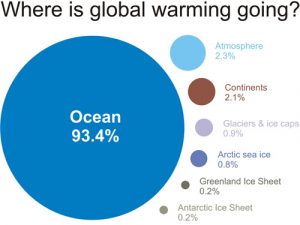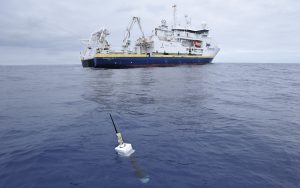When looking through the Science section of any prominent magazine or newspaper, it’s rare not to see an article involving climate change and its numerous impacts on our planet. It’s a topic that is constantly being discussed and rightly so, as it represents one of the biggest challenges that society is facing. Even if you have no idea of the science behind how our world is being affected, articles such as this one just recently posted in The New York Times online website, are good to get you thinking.

A visual depiction of how much global warming heat is going into the various components of the climate system for the period 1993 to 2003. (n.d.). Retrieved January 14, 2019, from https://skepticalscience.com/graphics.php?g=12
Our world’s oceans are the most dramatically impacted by global warming, and are the subject of countless research studies being done. One of the most concerning effects of climate change on the oceans, and perhaps the one raising the most questions, is the process of deoxygenation. This, in brief, is the process of declining O2 levels because of many complicated and interconnected biological, chemical, and physical processes. Perhaps the most fundamental and easily understood process that effects the way oxygen is exchanged between the atmosphere and surface ocean is the correlation between temperature and solubility; as temperature increases the solubility of oxygen decreases. This temperature effect accounts for up to half of the deoxygenation in the upper 1000m of the water column.
Being able to accurately model the changes in oxygen concentration is the biggest hurdle associated with deoxygenation. When modelling any part of the ocean, a researcher needs to understand and accurately represent the processes that are occurring. Seeing as oxygen is highly utilized and highly dynamic within any given part of the ocean, it’s extremely difficult to produce meaningful results. So, in most studies, especially those involving biological oceanography, a field where many processes are poorly understood, researchers must make certain assumptions. Additionally, these assumptions are highly dependent on that researchers understanding of the ocean.
The urgency of being able to obtain meaningful and reproducible models is always increasing. Declining oxygen levels in the ocean can dramatically affect the countless species that live in and depend on the ocean for resources.
Most notably, us.

An Argo float, foreground. The new study included direct measurements of ocean temperatures from the global array of 3,500 Argo floats and other ocean sensors. (2015, July 9). Retrieved January 14, 2019, from https://www.jpl.nasa.gov/news/news.php?feature=4655
The process of deoxygenation does not need to be looked at as a doomsday clock.
We have countless research behind us and every day, researchers work towards finding a solution that minimizes the effects that global warming has on the world’s oceans.
Cameron Carvalho
